Magen Cubed's Blog
April 23, 2020
Let's Talk About Sex, and Other Things
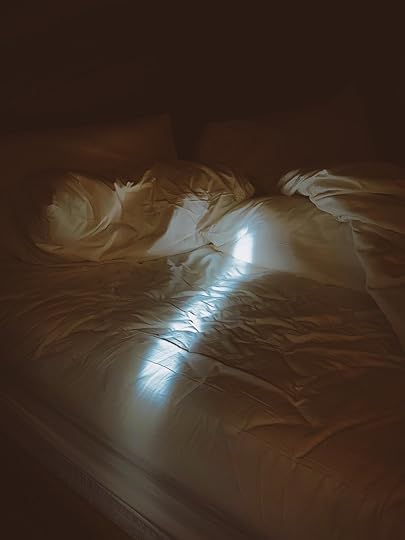
Trying to write about sex these days is a trip. Trying to talk about it in any capacity is an even bigger trip.At time of writing this, it is April 15th, 2020. There's a global pandemic on, and I've been social distancing for a little over five weeks. I have had a lot of time to ponder sex in fiction, and how I talk about it. It's a complicated, and often annoying, discussion to try to have at all. Especially when there's a global pandemic on.But I'm going to try to have it now.I walk a fine line as a writer in many respects. My paranormal romance books fall in a lot of categories and cover a lot of ground: from murder mystery to crime to romantic dramedy. They contain graphic sex to explore characters and themes. My paranormal romance short stories skew toward eroticism to more bluntly and effectively explore characters and themes. I think my short story, The Ecstasy of Cornelia Day , is a good example of that.Sex isn’t all I write about, but it’s something I care to write about. It’s something I spend a lot of time thinking about when I’m crafting a narrative. The plot informs the sex scenes I write and the sex scenes I write inform the plot. If you happen to find the sex titillating, great. If not, the plot carries on unabated because the characters were going to be having sex whether you were looking on or not.Sex can absolutely be used to titillate. It can be used for aesthetics. That’s fine. There’s certainly an element of aesthetic concern to the sex I write. I want the prose to be evocative and pretty. I want you to guide you, the gentle reader, toward my intended emotional response. I want it to be hot, too, because it is grounded in the clearly conveyed context of the characters, their emotional dynamics, and their physical chemistry. (I’m writing for entertainment, as well, you know, and my characters are quite attractive by design.)But I do have other concerns that I want to address, both in the context of the narrative and world outside of it.The sex I write is for pleasure, as well as a manifestation of agency. Characters are rarely just having sex to have sex. They are having sex in response to something else, any number of internal drives and external pressures that push them together. Yes, there is attraction, but sex is a dialogue, and sometimes my characters have sex about all the things they aren’t talking about. Sex is a dialogue, the way a fight scene is a dialogue. The way a dance scene is a dialogue. We use our bodies to say things, and it’s an effective tool in my storytelling toolkit. These things my characters say with their bodies may be negative things. They may be positive things. Sex can happen out of happiness or anger or grief. Sex can be a last-ditch effort to assert control of a situation. Sex can be a rapturous experience. Sex can be a defense mechanism. Sex can be a result of boredom. Sex can be for fun. Sex can mean nothing at all in the moment, and everything after the fact. The reverse can also be true.Yet, when we talk about sex in fiction, especially in online spaces, I find it reductive to the point of absurdity. The arguments always center on the same handful of questions:What function does this sex scene serve?Who can, in good conscience, view this scene?Is this sex feminist enough?Is this sex sending bad moral messages?What is this sex teaching the youth?Who is allowed – should be allowed, in good conscience – to write about sex?There are certainly critical contexts where (at least, in part) this line of questioning can be productive. When we discuss representation and exploitation, for example, I think it is useful to ask questions about the author and the gaze. However, as someone who writes sex in blended genre fiction that can’t always be explicitly categorized as erotica, most of these conversations are infuriating. In most contexts, they are meant to hamper our ability to talk about sex in fiction, as well as sex in our own lives. Cue a montage of me screaming about censorship of erotic content and erotic content creators on the internet. If you follow me on Twitter, you know this song very well by now.Sex is at once vapid window dressing (a cynical money grab because “sex sells”) and an unknowable evil that could poison the minds of the young or naïve. Sex in fiction exists to titillate the “wrong” audience, the “bad” audience, the assumed boogeyman stalking the margins of any given conversation. It should only exist in a safe, sanitized, and sterile way to serve as an education tool. If sex veers into the realms of the aesthetically unpleasant, emotionally complicated, or just plain kinky, it should be shut down for the harm rendered by the author.These conversations put me on the defensive about imagined crimes I haven’t committed, alleged by people who have no idea what I’m talking about. When I say I write paranormal romance, people sneer about sparkly vampires and bad role models for young women. When I say I write erotic romance, people sneer about Christian Gray and promoting abuse. When I say I write commercial fiction for adults that contain erotic elements, people sneer about the problematic material I’m forcing them to read.None of these people have ever read anything I’ve written, by the way.And, quite frankly, if you’re not enough of an adult to have these conversations with me, I’m done having them with you.I write stories that feature sex.I use sex to help tell intimate stories in fantastical settings.It’s a tool in my toolkit.If you are unwilling or unable to engage with the material in good faith, and to have an adult discussion about the content of that material, I can’t help you.But I’m not going to stop talking about it, either.
March 22, 2020
In Defense of Shitposting in a Post-Ned Flanders World

If you’ve followed me on Twitter for any length of time, then I’m sure you’re aware that I have garnered a reputation for shitposting. It would be fair to say that I dedicate quite a bit of time to shitposting about my stories, characters, and all related hijinks. I rarely come on Twitter unless I have a few jokes prepared, often scribbling them down when they pop into mind as not to forget them later.To be sure, the definition of shitposting varies depending on when, where, and how the term is used. In brief, Urban Dictionary defines it as:1: The failure to make a constructive post.2: The inability to add useful information to a forum.3: Worthless overly offensive generally racist posts written in a manner which aggravates others.4: An ironic art form of expressive yet apathetic funposting practiced only on s4s, the philosophical meme factory board on 4CHAN.I don’t think what I do stems from a lack of constructive content, nor is what I do offensive for the sake of being offensive. I’m definitely not keeping up with 4Chan these days, either. However, it isn’t really considered best practices by any working professional writer to take the absolute piss out of their own work on a daily (if not hourly) basis. This is why I think of what I do as a kind of interactive performance. Hang on, I can explain myself. (I swear this time.)It’s a genre of content designed to put people at ease as much as it is to amuse me. Online, I joke, at my own expense, or the expense of the long-suffering but obliging audience I project onto my followers. I perform a level of unabashed jackassery and self-awareness with my audience and invite them to participate. My monthly Patreon column, Dear Dorian, is an example of this. It’s an in-character Q&A wherein readers and patrons submit questions for me to respond to as Dorian Villeneuve of my queer monster-hunting paranormal romance, Southern Gothic. Dorian isn’t strictly in-character in every response. He’s portrayed as a more hyperbolic version of the loud-mouthed, fussy, crop top-clad vampire, engaging with a fictional extension of his own fictional world. I only offer shades of earnestness and emotional vulnerability to balance out the shitposting and keep things grounded. Otherwise, Dorian chastises readers for their tone and goes on tangents about hair metal bands and how much Dracula sucks.(Because Dracula absolutely sucks.)There is, of course, a method to my madness, as well as my decision to make this such a large part of my social media presence and Patreon offerings. It all has to do with Flanderization.TV Tropes defines Flanderization thusly:The act of taking a single (often minor) action or trait of a character within a work and exaggerating it more and more over time until it completely consumes the character. Most always, the trait/action becomes completely outlandish and it becomes their defining characteristic. Sitcoms and Sitcom characters are particularly susceptible to this, as are peripheral characters in shows with long runs.The trope is named for one of the examples in The Simpsons, Ned Flanders, who was originally just a considerate neighbor and attentive father, with his devout nature simply being that he willingly attended and paid attention in church, all to make him a contrast to Homer, before becoming obsessively religious.[…]In general, comedies, especially SitComs, fall into the trap of Flanderization because Character Development is far less important than Rule of Funny. Given a choice between getting a laugh or moving the story forward, getting the laugh will almost always take priority.To put it simply, Dorian Villeneuve and Cash Leroy run the risk of becoming Flanderized. This is the nature of writing a romance with comedic hijinks, especially a romance that lets its banter carry much of that burden. Their funny, sexy, opposites-attract chemistry is the selling point of this series – but that can have drawbacks.When working on a long series of novels, short stories, and other supplemental material, you’re dedicating most of your thoughts, time, and labor to the world and its characters. Dorian and Cash have been living rent-free in my head since Fall 2017. Writing them is essentially my part-time job, which I’m hoping to make a steadier source of income as I pursue the trade publication of the series. It’s also my hobby and my dedicated creative outlet. Over time, writing dozens of conversations in a multitude of scenarios, these two can become little monsters of their own making. Their personalities can become intensified. Their dialogue can become a self-perpetuating vortex of banter. Their actions and reactions can become so concentrated as to become completely obnoxious as the stakes continue to rise from book to book.Underneath all of this is a tender, sensual romance, between two characters who try to be their best selves for one another.This is why I shitpost. If I don’t, these characters would suffer for it, and I don’t think I’d be nearly as successful at telling their stories.The Dorian you see on Twitter can be a loud, bossy, slutty mess. He's put upon by everyone and annoyed by everything. This way, he can be a softer character in the books, giving and fiercely loyal despite his sharp tongue.Cash on Twitter can be dumb, despicably horny, and increasingly ridiculous in his thirst for monsters. (Up to and including getting gangbanged by 14 werewolves in public.) Then Cash can wear his heart on his sleeve when you see him next, the clumsy and well-meaning nerd that he is. I write them as shrieking, unruly, irredeemably horny disasters online so they can move through their world intact and compelling. Dorian and Cash can still banter and snark and get into trouble, but I get the extremities of their personalities out of my system. I can tone them down when things get serious and let them run loose on the page when I need a gag about Cash calling Dorian “daddy” by mistake or whether Krampus is real. So, no, technically, they don’t rawdog behind the Denny’s, but their love is real, and that’s what matters.And so is their daughter, Clementine, even if my girlfriend says I shouldn’t put her in the books. Clementine is real and I cAN PROVE IT But if you're a writer who finds themselves having trouble balancing the extremities of their characterizations, I suggest finding an outlet to get it out of your system. See if it improves your characters and gives you some clarity in where to take them moving forward.At worst, you might have a good time.
January 5, 2020
The Process of Adapting Short Stories, and Other Adventures

October 2019 marked a full two years since I wrote LEATHER & LACE for TWISTED ROMANCE from Image Comics. I don’t think I ever really talked about how I came to be part of the project, have I? It all started with a message from Alex de Campi. I first encountered Alex’s work when I was writing comic reviews for a trash comics news outlet and I opted to review the first issue of NO MERCY. If I recall correctly, I followed her on Twitter. She followed me back. I’ve been bothering her ever since.So, one day in September 2017, Alex sent me a Twitter DM to the effect of writing a short story for a romance anthology – or else. She was very nice and supportive about it, of course. I said I would think of something. Throughout the summer, I had been kicking around a story idea about a vampire and a human who hooked up to hunt monsters together. A few months obsessing over Damien and Robert from DREAM DADDY (my Goth Dad/Knife Dad is DADTP, thank you very much) had me primed to write a romantic comedy of some kind.I drafted what would become LEATHER & LACE throughout October and November 2017, alongside the first volume of A MONSTROUS LOVE. This was the first anthology submission I had been tasked to write in some time. I have a variety of indie and small press horror anthologies under my belt, but that was from another life. At this point, I hadn’t written anything since my 2016 superhuman/urban fantasy book THE CRASHERS . Its turbulent publication history, wherein my publisher filed for bankruptcy and shuttered a month after my book came out, left me cagey about the state of my writing career, to say the very least.Per Alex’s request, I finished the story. I put out my short amusing romantic comedy and procedural paranormal detective story, a tongue-in-cheek spin on SUPERNATURAL. TWISTED ROMANCE did okay in sales, given it was a romance comic and prose anthology in the crowded and noisy comics market. It even went on to garner a few award nominations, included an Eisner nod at 2018’s San Diego Comic Con.In the end, I felt pretty good about what I did, and decided that would be the end of Dorian Villeneuve and Cash Leroy. Since then, I’ve written two full-length novels and over 20 short stories and assembled a short erotic collection set in what I’ve come to call THE SOUTHERN GOTHIC UNIVERSE . Because of course I did. As of writing this, I’m in the middle of revising the novel adaptation of LEATHER & LACE, appropriately called LEATHER AND LACE. The process of adapting this story after nearly two years since first writing it has been interesting. A lot has changed, both for me and for these characters.I want to talk about that here, because people have asked, and because I think it’s an interesting topic.So, here we go.The Preamble

There were three kinds of teeth in the world. Dorian Villeneuve had seen only two before the night in the woods outside Devereux city limits: the kind for biting, and the kind for tearing. Vampires, werewolves, all manner of shifter: they belonged to creatures with animal teeth and a taste for blood. Dorian had a set of fangs of his own, after all, and he knew plenty about blood. The third kind of teeth he never saw on a hunt before: big, flat, and made for grinding bones. These were the teeth of man-eaters. It wasn’t until Dorian watched a set sink into his bicep that he took the expression to heart.LEATHER & LACE is about two monster hunters, a vampire and a human. The vampire is in love with the human. The human doesn’t have a clue. The hunters go to a karaoke bar, chase a wendigo (we’ll get to that later), and confess their feelings for each other in time for a duet of Stevie Nicks and Don Henley’s titular song. This is the exact sequence of events, and every scene in the short story is present in the novel adaptation.However, there are some critical differences in how I’ve approached the material, here in 2020. Let’s break down precisely how.The World
A vampire in wendigo territory wasn’t out of place. Vampires and wendigos went through the same channels to procure human materials. Even for it, Dorian held a breath as he walked up the steps to Paul Wright’s front door, hidden under his parasol.The world of SOUTHERN GOTHIC has greatly expanded since I first wrote the short story. I’ve developed the sociopolitical climate surrounding these characters, as well as the nuances of monster society. The language of the world has changed in small but productive ways, I think. Linguistic definitions of monsters are rooted in regional slang, rather than American bastardizations of indigenous language and beliefs. Werewolves are werewolves because that’s what English speakers would call a werewolf. Weredeer are weredeer and not wendigos, no matter how these creatures have been classified by tabletop RPGs and horror movies. The only time one would borrow from other languages or cultural shorthand is if the character is of that culture, or it’s a regional creature with no Americanized English name.In the novel, interactions between monsters and hunters are fraught but understandably so. The presence of human law enforcement in the lives of monsters is the greater threat. Hunters aren’t feared or even respected figures. Rather, they are an ugly but necessary mediator between the apparatuses of human governments and the diverse monster cultures humankind has relegated to the margins. By and large, hunters function as a membrane between monsters and humans. Hunters are used by human law enforcement. They are a class of laborers who hunt and kill violent monsters who would threaten the uneasy monster/human armistice. To be specific, hunters keep monsters from being dragged into the circus of the media and justice system, thereby exposing monsters to the human world. Cops keep monster crime out of the press and slide hunters money under the table to perform state-sanctioned executions. They are also used by monsters to self-police because monsters unable to turn to an uncaring and exploitative human law enforcement for help. This is where it gets a bit hazy. If a werewolf eats a human, you call a hunter. If a werewolf beats his werewolf wife or extorts his community, the community itself attempts to intervene. If intracommunal efforts of punishment and rehabilitation don’t work, you call a hunter. It isn’t pretty, or easy, or morally cut and dry. Cash knows monsters. He pays off informants in monster communities for information, trying to give them some fair compensation for sticking their necks out. As a hunter, he sees the pain and grief he causes to the communities he interacts with, even if they all understand the nature of his role within those interactions. And, of course, he befriends and takes the vampire Dorian as a partner.

The Plot
Dorian Villeneuve had made many bad decisions in his life. He liked trashy bars and long nights out, struggling with his habit of going home with nearly anybody who bought him a drink. Cash Leroy, however, was quickly becoming the worst decision he ever made, but for very different reasons.Most importantly, I think, the relationship between Dorian and Cash has changed for the better. This means that the plot, while the same in terms of the arc and plot beats, has still managed to change in some significant ways. In adapting the story, I rewrote, recontextualized, and reincorporated the many short stories I’ve written to flesh out their friendship. It works their entire relationship history in as flashbacks, from their first meeting to the frustrations of an uneven but not necessarily unrequired romance.I keep emphasizing friendship because the friendship between Dorian and Cash is the crux of LEATHER AND LACE as a novel. The original 6,000-word story followed two friends on their flippant, banter-filled adventure, coasting on Dorian’s one-sided longing for his attractive human mate. It assumed that friendship was an unwanted state, a kind of relationship made lesser by the lack of romantic intimacy and intent. After all, it was a short story, and I had to get these two dummies kissing in time for the duet.In the novel, their friendship is the rock bed of the story. Without it, there is no story. There is no story because this no love, trust, and respect to build the romance on. The friendship between Dorian and Cash steadies them in uncertain times. Dorian is a vampire down on his luck. He struggles on the streets of Devil’s Row, the vampire ghetto, to keep food in his belly and a roof over his head. He’s worked as a bartender, cocktail server, stripper, survival sex worker, and a semi-professional sugar baby, offering physical intimacy and companionship in exchange for some sense of financial security. Relationships are transactions to Dorian, because that’s how he’s stayed alive since being kicked out of his mother’s home at 16, without reason or warning. Cash, on the other hand, has been living a transient life as a hunter, relegated to the fringes of a society that has no concept of the monsters living among them. He’s a human, but he can’t tell anybody what he does for a living, or why he comes home at odd hours of the night with bruises and punch-black eyes. Intimacy is fleeting, and honesty is unheard of. Cash has casual sex with men to stave off the loneliness, then retrofits relationships around what few commonalities or interests they share to keep them around. It doesn’t help that Cash loves sex, but wants a relationship more, and so he’s willing to put up with people who don’t really care about him just to have somebody to come home to.Together, Dorian and Cash provide each other with what they lack. In Cash, Dorian finds a compassionate person who considers him an equal. Cash wants nothing but Dorian’s companionship, because Dorian is smart, capable, funny, and a good person. In Dorian, Cash finds trust, understanding, and someone invested in him as a person. Dorian wants to be around Cash, simply because he likes Cash. He cleans up Cash’s bloody noses, takes care of Cash on the job, laughs at Cash’s dumb jokes, and respects Cash’s unending devotion to Stevie Nicks when other people can’t be bothered.They’re friends and partners above all else. We see how they meet, how they come to trust each other, how Cash trains Dorian to hunt, and how their attraction to each other blossoms into a romance. But it’s the very friendship they treasure that drives a wedge between them, and ultimately serves as the obstacles to becoming a couple.Dorian, wracked with self-loathing, is terrified of committing to a relationship, ruining it, and losing everything.Cash, fearful of being alone, is terrified that if he doesn’t show Dorian that how much the vampire means to him, Dorian will slip away.Which is, of course, very different from how they are in the original short story, about a lovesick vampire and a cute boy who likes another, more traditionally handsome lover. To see how we go here, I need to talk about how much Dorian and Cash have changed in two years. How Dorian and Cash have changed since their first appearance in the pages of TWISTED ROMANCE #1 has not only impacted the tone of the book, but it has also impacted the shape of the overall series. These characters have become so much more lived-in. Their hard edges have been filed down; their temperaments softened and made more relatable. I don’t mean to say that they weren’t interesting before (I wouldn’t have spent the last two years writing them if they weren’t), but I feel the adaptation process has made them into people worth spending time with as they grow over the course of three, four, or more books. So, let’s talk about that.

Dorian Villeneuve: Not the Vampire You Think He IsThe first time we meet Dorian Villeneuve, he’s an anxious, lovesick vampire. He’s an ill-fit in the world of hunters, using his luck and determination to compensate for his inexperience. Dorian relies on his sarcasm to compensate, as well, covering up the fact that he’s a stranger in Cash’s world, and one racked with in equal measures of self-doubt and self-loathing.In TWISTED ROMANCE, Dorian’s lack of self-esteem manifests most prominently in his anxiety over his appearance. He is slim and feminine, with long hair, a somewhat gangling physique, and a gothic aesthetic marked by black nails and smoky eyeliner. Next to Cash’s love interest, Max Miller, Dorian feels insecure. Like Cash, Max is rugged, strapping, and masculine. Dorian assumes he isn’t what Cash is looking for in a partner and resigns himself to pining for his best friend.And, in hindsight, I can say with complete, clear-eyed certainty that this sucks. It sucks a lot.Granted, in the space of 6,000 words, I used it as a quick, relatable shorthand in a simple romcom plot. Dorian feels like he doesn’t belong, and Cash doesn’t want him, so let’s go with the cheapest, dirtiest way to get that point across. Self-esteem and body image issues are relatable, right? But it sucks because it places Dorian’s gender in opposition with Max’s – and, by extension, Cash’s. It makes Dorian out to be lesser than Cash and Max – a lesser person for being feminine. You see how that can read?So, in the book, I made the conscious choice to do away with that dynamic entirely. I did that by building vampire society from the ground up.As a vampire, Dorian doesn’t conceive of gender and sex the way mainstream human society does. Vampires don’t see gender or sexuality identity as static or binary, putting little weight on genital configuration or what any given vampire chooses to do with their genitals at any given time. This doesn’t make for a fully egalitarian society, much less a utopian one. Rather, vampires simply never conceived of hierarchal power rooted in such binaries.As such, Dorian isn’t a man or a woman, and he doesn’t conceive of himself as either. He just…is. By nature, Dorian feels more at ease with himself – comfortable in his own skin – when he dresses and presents as femme. Long hair, eye shadow, painted nails, chokers, cut-off shorts, crop tops, a face free of whiskers or a beard. The masculine doesn’t offend Dorian. It just isn’t right for him. He doesn’t like the way it looks and feels. It makes him anxious to grow a five o’clock shadow or to go out without looking the way he wants to look. Dorian takes time out of his day to get ready, and he makes a conscious effort to maintain his appearance. In a life where he has little control of his circumstances due to a lifetime of poverty, this is the one thing he owns. And he’s allowed to own it, because there’s no one, at any level of vampire society, telling him otherwise.The Max Miller of the novel, with his perfect abs and teeth, doesn’t infringe on that, because he has no reason to. Why would he? What kind of a cheap, loathsome villain would that make him? What would it say about Cash to be with somebody like that?Max doesn’t invalidate or intimidate Dorian anymore, because Dorian isn’t measuring himself against Max. Dorian isn’t measuring himself against Cash, either, who’s no less masculine than he was in the original short story. (Given a full novel to be a tall, ruggedly handsome, broad-shouldered, hairy-chested man who has very manly sex with Max about halfway through the book, Cash may be even more masculine than he ever was in the short story.) Dorian is who he is, and he’s comfortable with that.What he isn’t comfortable with, in a wholly contradictory way, is himself. Rather than simply pine for Cash, Dorian struggles with the depression and anxiety that comes from a lifetime of uncertainty and feeling like a burden on the family that eventually kicked him aside. He never feels that he’s good enough for Cash. That he doesn’t deserve Cash. That Cash should want somebody better. It’s that fear of being lesser – of being broken, and of being a burden, and of someone finding it out to be true all along – that haunts Dorian. To put it bluntly, these are the effects of abandonment, poverty, and untreated mental illness that has defined Dorian’s life in the vampire ghetto of Devil’s Row. He has so little and has lost so much. Now, Cash represents his new life, and the freedom that comes with it. The fear of losing that, and ending up alone again, racks Dorian. It drives him to self-sabotage and to act against his own best interest, even though he is wholly worthy of the love Cash wants to give him.Here in the novel, with a better sense of self to propel him, Dorian is complicated.In the novel, Dorian carries a knife, because he’s good with a knife. He’s stronger, faster, and more agile than Cash on the job. Cash may have the training and the years of experience, but the human is weaker, slower, and highly killable by the monsters they hunt for a living. The Dorian of the book doesn’t need saving because his mettle has already been tested. Instead of being saved by Cash’s marksmanship or honed instincts, Dorian keeps Cash safe from harm by holding back the monsters Cash simply can’t. And whenever Cash gets a busted lip, bloody nose, or broken bone, Dorian is there to clean him up. Put Cash back together. Keep Cash safe. Because that’s his job, and Dorian wants to be the one who gets to do that.Oh, and also Cash is a very different person than the guy we first met. Let’s talk about that.

Cash Leroy: A Study in ContrastsGive me a moment to be brutally honest with you. In the original short story, Cash Leroy was underwritten. He was my response to and antidote for the type of leading man found in action-horror movies, monster-hunting fiction, paranormal romance at large. Rural, masculine, good-looking, plaid-sporting, good with a gun, and chock-full of toxicity. Yes, I’m talking about Dean Winchester. Of course, I’m talking about Dean Winchester. If you didn’t think SOUTHERN GOTHIC was a jab at SUPERNATURAL (down to the pairing name, D/C, because I am a crazy person), I don’t know what to tell you.Cash is a gay man, who loves Stevie Nicks, a notable icon in large subsets of the queer community. He loves to sing and is open about his feelings, despite being a buff jock. He’s very traditionally good-looking, bordering on underwear model levels of absurdly handsome. Naturally, he wears a lot of plaid. Cash is a stereotypical alpha male in theory, but not at all in execution, which makes him a loveable subversion of audience expectation.As seen in TWISTED ROMANCE, it makes sense why Dorian wants Cash. However, it isn’t particularly clear why Cash wants Dorian, because there isn’t enough of a character to work with. Cash is the love interest in a very short romance story, after all. Sexy and into karaoke is about all we can say about him.In the novel, that changes, because we slow way down and spend time with Cash as a person rather than a subject of Dorian’s affection. And Cash, as a person, in his own words, is a hot mess.An earnest, vulnerable, well-meaning mess, but a hot one, nonetheless.In the book, Cash now has an origin story: the sole male in the well-established Mendoza hunting matriarchy, a long line of Mexican vampire hunters. His mother ran off as a teenager and married outside of the life, against the family’s wishes. Leaving home, she settled down with a white Cajun preacher and gave her only son his father’s name, Leroy, thereby breaking the established tradition of the Mendoza family. From birth, Cash is not quite fit for the world he’s born into.Cash grew up in a small, lonely town on the border of Texas and Louisiana, where he was torn between being a stoic hunter’s son and a soft-hearted preacher’s boy. This gives him a big, round, pronounced East Texas drawl that is more closely associated with poor or uneducated women than the kind of respectable, masculine accent you know from notable Texans like Matthew McConaughey and Jensen Ackles. He’s a hunter raised by women to carry on a tradition he didn’t ask to be born into, coming up as something of the disappointing heir to a throne that wasn’t quite made for him. In that regard, Cash is too soft for the world of monsters. He loves to sing, and he loves Stevie Nicks even more. He wears his heart on his sleeve, open and honest to a fault. He wants to settle down and make a home, because hunting is a lonely, dangerous job that keeps him from telling the truth about what he does for a living. He doesn’t want to leave hunting, because he doesn’t know any other kind of life or work, but he wants more than what he has. And what he has before meeting Dorian is casual sex and fleeting relationships that leave him feeling well and truly alone in the world.The Cash of the original story is swaggering but well-intentioned. This Cash is full of bruises and scars, nicks and scratches and broken bones. He has tattoos on his arms: a cross for his father on his left, a gun and the Mendoza name for his mother on his right. There’s a tattoo of his birth sign, Leo, on one wrist and the outline of the state of Texas on the other. A horseshoe and his birthdate with the words “Good Luck” wraps around his ribcage, a customary hunter tattoo that he got with his two childhood friends, Devon and Demi Constantino. He also has pronounced ears (that his mother assures everyone that he “grew into”), a nipple ring, and a name tattooed on his chest that he had removed for reasons that we definitely don’t know about yet. Why? Well, why not? He’s a weird guy, who comes from a weird place, who has a lived-in body with its own wants and needs and stories to tell. A body that wants affection and attention. A body that needs to be cared for. A body that smiles, puts on a good face, and keeps his wants to himself, because he’s used to not getting what he wants.One that is attracted to Dorian, because the vampire is smart, and funny, and beautiful, and Cash’s best friend, and the best person Cash knows. The only person who sees Cash as who he is: a bundle of chips and cracks and damaged nerves, assembled around a big, soft heart. A man wants to make a family with someone he loves and make the very best of what he expects to be a short, dangerous, and nasty life.
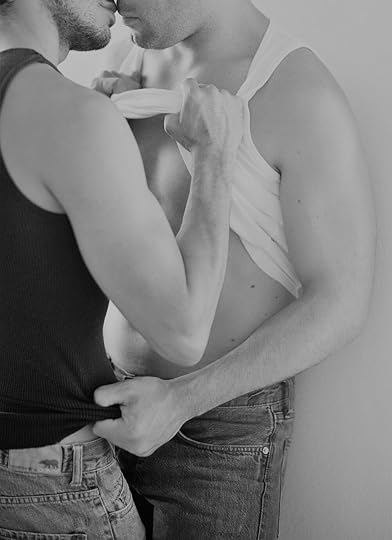
What Does This Make of The Book?Dorian is afraid to be with Cash because he’s afraid he’ll end up with nothing.Cash is afraid to be without Dorian because he’s afraid he’ll lose everything.Over the course of five bloody days in Devereux, on the hooves of a spree of weredeer killings, they’re going to meet in the middle and tell each other the truth. Otherwise, the friendship they’re trying so hard to protect isn’t going to survive the hunt.I hope you stick around to find out how all this shakes out.
December 17, 2017
I Got More Records than the KGB: Or, an update

Hi, hello, how are you? It's been a while since I've posted an update. Nearly a year, in fact. Here's a list of things I've been up to.
I released a F/F short horror double feature for Halloween, A MONSTROUS LOVE. Now available on Amazon.
I announced my M/M monster hunting romcom in the upcoming Image Comics anthology series, TWISTED ROMANCE. Coming this February to a comic book store near you. You can see a preview here from Entertainment Weekly.
I was recently interviewed on Comicosity about TWISTED ROMANCE. I have more interviews coming soon.
I also have bylines at Ms En Scene, the film/TV sister site of Eisner-nominated Women Write About Comics. You can find my latest writing here.
Catch you later.
MC
January 1, 2017
A List of Things that Happened in 2016

I graduated from college.
I spent 10 days in Florida with my girlfriend Melissa.
I wrote two books. I published three.
I cried more than I expected I would.
I turned 30. It was raining on my birthday. I felt incredibly alone.
I let some things go.
I realized I no longer belonged here.
I didn't really sleep.
I was in a car wreck. It should have killed me. I didn't get hurt.
I was sick a lot.
I tried to help people when I could. It didn't always work.
I spent the anniversary of my 2015 breakdown in my therapist's office.
I was too depressed to write as much as I wanted.
I found out who my friends were.
I took a lot of selfies.
I was given some good advice.
I started trying to repair things with my parents.
I thought a lot about art and how to be a better writer.
I grew my hair out.
I hugged my dog every day.
I drove to places I'd never been to before.
I felt like someone died on November 8th. I stayed in bed until November 10th.
I was scared all the time. Even when I wasn't, I was.
I made hard decisions.
I sat by the ocean on Christmas Eve.
I sat in the sunshine whenever possible.
I didn't think I would make it.
I did.
September 19, 2016
Out of the Flames, Back from the Dead: The Crashers
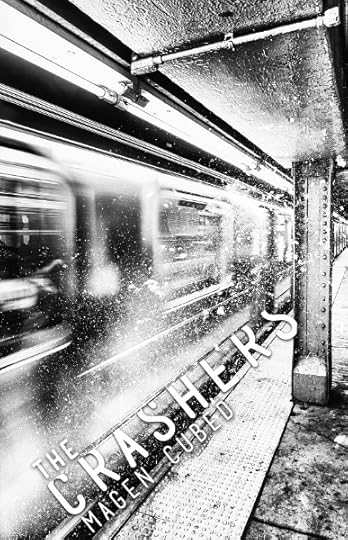
It seems fitting that a book about people who die and come back would have the story that it does.
In case you don't know the story, a long time ago, I was signed on with a publisher named Booktrope. Booktrope published my superhero novel The Crashers back in April. Then at the end of April, Booktrope announced they were folding. Cue three months of confusion, waiting, frustration, and playing Rights Roulette with all of my assets as my publisher quietly closed their doors with a lot of shrugging and empty platitudes.
Needless to say, that was the opposite of fun.
Now, fast-forward to September. I have my manuscript, my cover, and all my licensing squared away. Fast-forward to tomorrow, upon which time you'll be able to purchase The Crashers as it rises from the grave and to warm your Amazon Kindle. Perhaps, if I can get enough money together, I can pay to have it published in paperbacks again. For now, you'll have to settle for being warmed by the glow of your mobile book reading device of choice. (It'll also be on OmniLit in PDF and Epub formats if that's your thing!)
So, what now? Good question. To be honest, I have no freaking idea.
All of this is happening on a wing and a prayer, so I push my love letter to slash dissertation on contemporary superhero comics and culture back into the world. I tried agents and publishers and, while I got a lot of thumb-ups and compliments, I was told the book was unmarketable. So here we go. Enter: self-publishing!
I've sent out review copies, submitted review requests to blogs and podcasts, and have done all the marketing I can afford on a shoestring budget of a broke liberal arts student. The next book in the seven-part series, The Crashers: Koreatown, is still in the editing phase while I wring my hands about going back to finish it up. The next several books are in various stages of plotting. I have a small but vocal fan community around the book that has championed me on and helped me stay positive amidst the chaos of the summer as I waited for the legal minutia to resolve itself.
But, beyond that? I'm self-publishing books while finishing college. I have no marketing budget, no PR, and no publisher. All I have are characters that people seem to love, a story that's quickly tumbling out of my hands as it strives toward bigger, dumber, loftier things, and readers who want to see how it all plays out.
That's all I'm doing now: seeing it plays out.
The Crashers will be available 9/20/2016. See you all in Koreatown.
July 14, 2016
Upcoming Horror Anthology: I Felt Their Teeth In My Bones
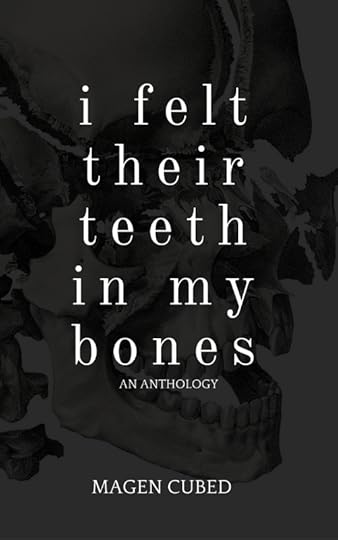
There are two things I have to tell you:
1. You look very nice today. Is that a new sweater?
2. In a desperate bid for relevancy in this cold and empty void, I'm putting out an anthology of horror, weird tale, creepy romance stories, and other odd things.
I Felt Their Teeth in My Bones is coming to your Kindle later this month. At 43k words, this collection features nineteen stories written between 2009 and 2015, and is everything of mine worth collecting. Everything that I felt was worth collecting, anyway. You may not agree, and that’s quite alright. Most of what you see has been previously published, be it online or in print, in various original horror and weird tale anthologies. Some stories have never been published.
What kinds of stories do you have to look forward to? Glad you asked. I tried to make sure there was a little something for everyone.
Are you a romantic? Try At the Heart of Mina Jones or Molly’s Entropy. Looking for something a little more uplifting? The Dollhouse or In Case of Armageddon might suit you. People in search of the strange may get a kick out of The Aquarium, Harold’s Girl, or A Fresh, Clean Soul. And, of course, we begin with The Drain, a story about an octopus. Because octopuses are rad as hell, and that’s all you need to know about that.
Interested? I hope so. If not, have an excerpt for The Aquarium, a queer horror romance story about sea monsters:
It would be three days before Lily saw the shadows again, curling from behind the bedroom door in broad black arms. She paid them no mind at first. Blamed it on an overactive imagination or bad late-night television and willed herself to sleep, face buried in her pillowcase with a determined sigh. Instead of finding sleep behind closed eyes, Lily's mind conjured visions of black water and firework starbursts. The creak of the bedroom door – old hinges, she assured herself – gave her goose-flesh and she sucked in a breath between her teeth. She blamed that on the television, too. Perhaps she should be more like her mother and only watch the news. Her mother would like that.
Tendrils crept around her bedroom walls. With the slow, sticky sound of wet flesh the octopus’s arms wound down her bedposts in languid stop-motion to drop, drip, winding out across the floor beneath her bed-frame and slipping beneath her sheets. They curled to touch her toes, greedy suction cups biting into the bottoms of her feet, curling around her ankles as they slithered up her calves, wet and cold and alive. Each arm had its own mind, slow, determined, like the touch of the lover she did not have. Lily gasped.
Not your speed? Try Speak, the most recent story in the anthology, and one of the more disturbing entries:
You wake up in a cell. You don’t know how long you’ve been here. All you know is that you’re here now.
The space is small, damp, and gray. Every inch of your body hurts when you try to move, sitting up from your sprawl on the cold concrete. There is a bed against the farthest wall; the metal frame is warped and the mattress is flimsy. You were dropped on the floor instead. There are no windows here, only a fluorescent ceiling fixture with a dingy plastic dome and a switch you can’t reach. The insects that slipped between the ceiling and the plastic lip flutter, their beating wings like raindrops. It takes a while to notice this when your brain feels like it’s wrapped in cotton.
Everything hurts.
There is a door. It’s heavy, made of steel. You crawl to it, on all fours like an animal with the way your body aches. You pound on it. It doesn’t budge.
Eventually, you notice the person on the floor across from you. The person looks like a man, looks like an adult, and looks like he’s dead. He’s face down on the concrete just as you were when you awoke. His legs are limp and his fingers are curled in. His eyes are open and clouded. You flinch away from him at first, the light above making you blind before your vision settles. Once your pulse slows, you creep toward him to shake his shoulder. He never moves, something swimming behind his washed-out eyes.
“Speak.”
You flinch for a second time. There’s a speaker in the corner above the bed. It’s old and rattles in its battered metal casement when the voice grinds out again, “Speak.”
You ask them what they want.
“Tell us your secrets.”
So, there you have it. Expect to see I Felt Their Teeth in My Bones coming soon to a Kindle near you.
May 26, 2016
On Wasting Your 20s
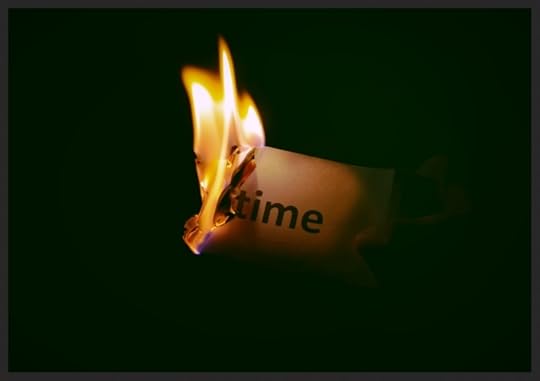
So I just turned 30 last week.
I know, I know. I don't look 30. I still get carded buying cough medication and trying to get into R-rated movies. Moving on.
Despite the cultural pomp and circumstance surrounding the Big 3-0, my birthday was a non-event. It was a strange, kind of boring, kind of sad day, to be honest. I was sick and it was rainy outside, and I just felt a bit lonely. More than that, I just felt a little defeated. After all, you have to have some of that customary, "Oh my god, I wasted my 20s, drinking beer and eating sushi like a giant sad puppy in human clothes" malaise.
Now that it's been a week, I've slept. I've taken some cold medication and gotten some work done. I took a walk or two. I feel better. And so, having come out of that particular funk, I'm had some thoughts about the whole idea of "wasting my 20s."
The age-old adage of "Your 20s are where you fuck up" is true enough, I guess. You're probably not very smart, experienced, or resourceful yet. You're somehow expected to arrive in the world as an adult, when your brain's probably not done being a teen yet, and have this whole grown-up thing Worked Out. You're also expected to completely fuck up. I mean, fuck it all up. Party all the time! Drink too much! Date the wrong people! Hell, marry the wrong people if you can! You're young! Burn your bridges! Time is on your side!
So many movies and books are dedicated to this hackneyed old plot, so feel free to fail. Culture condones it. Just make sure you finish school and get a great job and get your life together and buy a house and get married. Do all of those things to fuck up your life, but be sure to be successful while doing it. It's what you have to do. Make that 30 Under 30 list or die trying. Shrug emoji.
But...what if you didn't fuck it all up? What if fucked up stuff just happened to you in your 20s?
What if you spent your 20s being responsible for your parents or siblings? What if you're taking care of your children? What if you're helping take care of other people because they can't work, or because they're sick? What if you have to take a series of lousy jobs to keep the lights on? What if you have to drop out of college? What if you fall behind? What if you're broke because you've been sick for years? What if you've had an accident, or a chronic illness? What if you've had serious bouts of depression? Did you fuck it all up then? Are you fucked up?
What if you were too busy trying to stay alive to fuck up your 20s by partying and being bad with money? What if you didn't have time for fun? What if you had no Mumblecore coming-of-age moment? Did you waste your 20s then? Did you lose your youth? Are you really an adult if you went from teen to grown-up with no socially acceptable, commercially sanctioned in-between? If your 20s are the grace period for the rest of your life, was it all for naught?
So yes, by the measure of many, I certainly fucked up my 20s. I dropped out of college and took shitty jobs to keep the lights on. I didn't make plans. I spent a lot of time working at places that I absolutely hated, and making sure other people were taken care of, and crying myself to sleep. There were years when I didn't know if my family would lose their house. There were years that I was certain I would be dead soon.
I never made it onto a 30 Under 30 list. I didn't those publish five novels. I didn't even move out. I'm 30 and just now about to wrap up my undergrad work while 20-somethings sit next to me in class in awe that I'm so old. Oh well. They're still young, and life can still disappoint them at any moment.
So, yeah. I turned 30 last week. I turned 30, having gone through my 20s assuming I would already be dead or homeless by now. So happy belated birthday to me.
May 21, 2016
Buy This Book, Kill This Book, and Other Stories
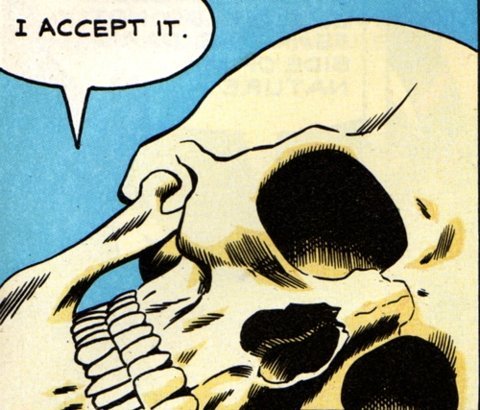
On April 8th, my book The Crashers came out. It sold pretty well. It got some nice reviews. People seemed to enjoy it. It felt like the book was gaining some good momentum, for a little indie superhero book from a little nobody author. I was making plans to return to the sequel, The Crashers: Koreatown, to get it ready for publication by winter.
On April 29th, my publisher, Booktrope, announced that they were shutting down effective May 31st. My rights will revert back to me on June 1st. Otherwise, amid rumors, misinformation, mushy legal advice, and a general wave of panic, The Crashers is now homeless. Not dead, per se, but rather shambling toward a quiet, inevitable dark period.
And so it goes. Another small publisher bites the dust. It seems to be happening more and more these days, if the amount of small press authors venting on Twitter is anything to go by. With so many publishers soon to be closing their doors due to poor sales, it's hard not to feel disappointed, frustrated, and maybe a bit foolish for buying into somebody else's dream.
There's a lot of reasons these publishers are folding up, none of which I feel like getting into today. You have Google, friend. Use it at your own discretion.
Other than doing my fair share of screaming on Twitter, I haven't said much on the topic. There have been a lot of upbeat blog posts going around since the announcement. I, uh, wasn't among the upbeat. I wasn't even among those with coherent thoughts to readily dispense on the matter. It wasn't from a lack of trying, of course. I sat down four or five times to write something about it over the last few weeks, but always came up short. At best, I wanted to punch something. At worst, I just ended up crying. It always felt pointless, be it rage or tears. I'm not the first writer to have a publisher fold on her, and I certainly won't be the last. So it goes.
As it stands right now, on May 21st, as I wait for the clock to run-out on both Booktrope's existence and its right to my work, I'm trying to take my own advice. I'm trying to be calm. I'm trying to breathe.
It still stings, and I'm still mad as hell, but I accept it. I'm madder about how this whole thing shook out than the fact that it did, but I'm pretty sure the dirty laundry's been pretty well aired out by this point. That, and you can only yell at a brick wall so long before you realize the brick wall is content to go on its merry way, regardless of how you feel on the matter. (As a side bar, have you ever gone through the five stages of grief in one weekend? I don't recommend it.)
So, I hear somebody asking, what now? What next for me and Crashers? That's a good question. I'm still coming up with my thoughts on that. I've started drafting and sending query letters. I've gathered a list of agents. I've started banging on doors. Is trade publishing an option, or even a good option, for this book? I don't know. Is self-publishing the answer? I doubt it, because I have plans for more books, and it doesn't seem like a feasible long-term solution. I just don't see myself being able to afford the costs of paying the necessary editors and cover designers for the foreseeable future.
I don't have answers. But what I do have is a book and a give 'em hell attitude. So I guess that will have to do for now.
May 13, 2016
On Comics: Satellite Falling #1 from IDW
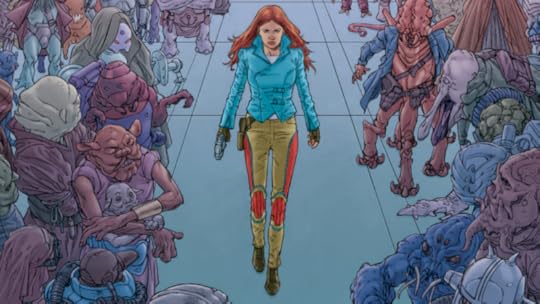
I've been out of the comic book reviewing game for the last few months. This is for a lot of reasons that I won't go into at the moment, but when series writer Steve Horton approached me on Twitter about reviewing his new comic Satellite Falling #1 (out from IDW Publishing as of May 11th), I decided it might be a nice excuse to do some writing.
Written by Steve Horton (Amala's Blade), illustrated by Stephen Thompson (Star Trek, Brooklyn Animal Control), and with colors by Lisa Jackson (Angel), the best way to describe Satellite Falling is a sci-fi detective story with some punch and a lot of potential. It follows Lily, a jaded human bounty on an alien world where she's the only one of her kind. Using gadgets to disguise herself as one of the many alien races she encounters, she goes on undercover operations and tracks down criminals in suitably dingy futuristic locales. All of this, along with a reasonable amount of extraterrestrial sexy times, is to cover up her ongoing grief over the loss of her girlfriend, Eva. While Eva's fate is unknown as of the first issue, it is assumed to be appropriately tragic, which provides the context for Lily's narration, addressed to Eva in the form of a recorded message.
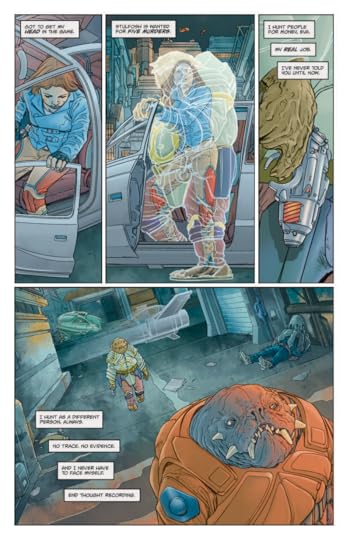
Art by Stephen Thompson and Lisa Jackson
The book knows its noir conventions, even as it dresses them up in a shinier, sci-fi/fantasy aesthetic. Loss, regret, memory -- familiar themes splashed against a canvas populated with bizarre alien bodies and sloping, metallic architecture. Horton's script drips with hard-boiled swagger, with nods to Rick Deckard of Blade Runner in both Lily's attitude and profession. It tickles the part of my brain that always lights up for pulpy dialogue. The plot, heavy on set-up given that this is a #1, is predictable, but contains enough fun twists and subversions of standard detective tropes to give it some flair.
Thompson's artwork, with Jackson's color palettes, are the main attraction to this title. The linework is clean and light overall. Jackson consciously undermines the gritty tone of the world and its characters with bright, vibrant coloring. Soft hues of blue and pink lull the reader into a somber state as Lily's narration carries the first third of the three-act book, before shifting to the deeper, bolder color choices in plot- or action-heavy sequences. It creates somewhat of a jarring tonal shift for me personally toward the end of the issue, but given how it reflects the action on the page, I appreciate the implementation and effect.
Thompson's complex exterior architecture and cityscapes affect rounded, organic shapes, which stand apart from the sterile vertical planes of interior spaces. Beneath the glittering chrome of the skyscrapers lurks the grubby underbelly of the urban spaces where Lily traverses. Here the cracks in the shiny science fiction veneer give way to the crime story driving the plot, grounding both elements in a tidy shorthand. Everything in the book is a negotiation, from the aesthetics to the tone, actively seeking balance with the other elements. It's neither too gritty nor too upbeat, too hard nor too soft. I found myself paying attention to the details in every panel, caught by the casual juxtaposition between seemingly competing visual and tonal styles.

Art by Stephen Thompson and Lisa Jackson
The character designs achieve a similar contrast. The alien creatures are wildly diverse and wonderfully detailed, with all manners of eyes, mouths, pincers, fleshy ridges, and tentacles. This biomorphic variety makes Lily look remarkably small, fragile, and alien in relation. Although she is the most familiar creature we see (not taking into account the walrus-like criminal she encounters in the book's opening), she looks the most foreign, lonely and lost.
Even without Lily's mournful narration, we see how profoundly alone she is. It makes what little intimacy we see her enjoy in this issue all the more meaningful and less paint-by-numbers. Yes, Eva haunts her memories in ghosting touches, and yes, there's a somewhat obligatory (albeit potentially emotionally complicated) sex scene, but the visual context provides a little more depth than I often see in stories about humans on strange worlds.
Satellite Falling #1 plays with many familiar themes and genre conventions, but it pulls them all together well for an opening issue. It's pulpy, sci-fi fun with some genuinely interesting concepts and storytelling decisions that I appreciated. The book definitely has potential, and I'm curious to see where it goes in coming issues. If you like all things spacey, pulpy, and full of goopy aliens, I recommend picking it up.



